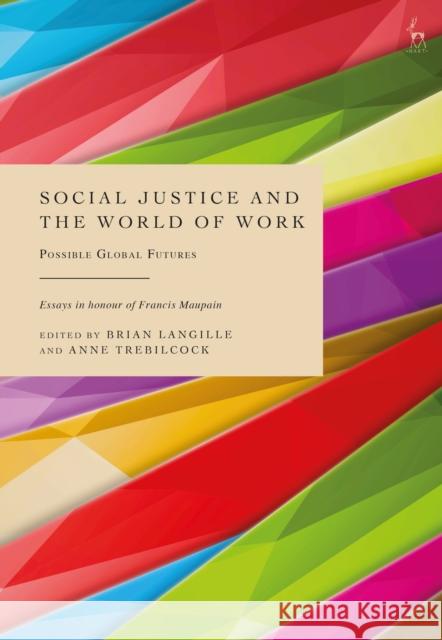Social Justice and the World of Work: Possible Global Futures » książka



Social Justice and the World of Work: Possible Global Futures
ISBN-13: 9781509961252 / Angielski / Twarda / 2023
Social Justice and the World of Work: Possible Global Futures
ISBN-13: 9781509961252 / Angielski / Twarda / 2023
(netto: 556,32 VAT: 5%)
Najniższa cena z 30 dni: 545,34
ok. 22 dni roboczych.
Darmowa dostawa!
Obwoluta
Introduction: A Framework for Thinking about the Future of Social Justice Brian Langille (University of Toronto, Canada) and Anne Trebilcock (University of Göttingen, Germany) PART I GOALS AND CHALLENGES A. Clarifying the Idea of Social Justice in Work 1. Globalisation or ‘Mondialisation’? Taking Social Models Seriously Alain Supiot (College de France, France) 2. Social Justice and Reform of Capitalism Adalberto Perulli (Ca’ Foscari University, Italy) 3. Learning from the Past for the Future of International Labour Law Adelle Blackett (McGill Law School, Canada) 4. Two Institutional Paths Toward the Future of Work – A View from the Edge of the Field Kerry Rittich (University of Toronto, Canada) 5. International Axiologies for Social Justice at the International Labour Organization: Value-based Perspectives and Ways Forward Jordi Agustí-Panareda (International Labour Organisation, Switzerland) 6. ‘A Just Share of the Fruits of Progress’: What Does It Mean? K D Ewing (King’s College, London, UK) and Lord Hendy KC (Barrister, UK) B. Critical Dimensions of the Global Future of Social Justice in Work 7. International Environmental Law and Social Justice: On Encounters Laurence Boisson de Chazournes (University of Geneva, Switzerland) 8. Sustainability as a Guide for the Future Development of International Labour Law? Tonia Novitz (University of Bristol, UK) 9. On the Irrelevance of Citizenship in the House of Labour Alan Hyde (Rutgers University Law School, USA) 10. Restrictive Visa Schemes and Global Labour Justice Virginia Mantouvalou (University College London, UK) 11. Persistent Gender Gaps: Past Priorities, Future Prospects for the Pursuit of Equality in the World of Work Shauna Olney (International Civil Service Commission, Canada) PART II MEANS A. International Institutions and the Future of Global Labour Justice I. The International Labour Organization 12. The Past and Future of Governance: Epistemic Authority and the ILO Jan Klabbers (University of Helsinki, Finland) 13. The Resilience of Multilateralism: An ILO Introspection for a System-wide Vision Tomi Kohiyama (International Labour Organization, Switzerland) and Thomas Lieby (International Labour Organization, Switzerland) 14. The Contemporary Quest for Social Justice: Some Further Thoughts on the ILO Contribution Jean-Michel Servais (University of Gerona, Spain) 15. The Impact of the Standards Review Mechanism on the Future of International Labour Standards: Not Even Diamonds are Forever Claire La Hovary (International Labour Office, Switzerland) 16. Is the ILO a Legitimate Global Institution? Supriya Routh (University of British Columbia, Canada) II. The World Trade Organization and the Trade and Labour Nexus 17. Reforming the WTO to Better Promote Social Justice Steve Charnovitz (George Washington University, USA) 18. A Tale of Tripartism, a Tribunal and Trade Desirée LeClercq (Cornell University, USA) III. The Potential of Regional Systems 19. Achieving Social Justice through Investor-related Labour Obligations? Brief Insights from the African Investment Treaty Practice Makane Moïse Mbengue (University of Geneva, Switzerland) 20. A Regional Revitalisation of Labour Rights? The Emerging Approach of the Inter-American Court of Human Rights Franz Christian Ebert (Max Planck Institute of Comparative Public and International Law, Germany) 21. Social Sustainability and Labour rights in a Resilient EU Bruno Caruso (University of Catania, Italy) and Veronica Papa (University of Catania, Italy) B. Possible Futures of Global Labour Justice by Other Means: Public and Private Actors 22. Peeling the Onion: On Choices Judges Make in Transnational Labour Litigation Judy Fudge (McMaster University, Canada) and Guy Mundlak (Tel Aviv University, Israel) 23. The Use of Arbitration to Resolve Transnational Labour Disputes Katerina Yiannibas (Columbia Law School, USA) 24. Buying beyond our Borders: Public Procurement and Labour Rights in Global Supply Chains Olga Martin-Ortega (University of Greenwich, UK) and Martina Trusgnach (University of Greenwich, UK) 25. EU Trade Preferences and Human Rights in Myanmar Richard Horsey (independent expert, Myanmar) 26. The Future of Health and Safety at Work as a Fundamental Principle and Right: Will it meet ISO and UN challenges? Isabelle Daugareilh (University of Bordeaux, France) C. ‘Labour Law Itself’ and the Future of Global Social Justice 27. On Social Justice and Artificial Intelligence: Trade Unions as Instruments for the Dissemination of Transnational Norms Julia López López (Pompeu Fabra University, Spain) and Eusebi Colàs Neila (Pompeu Fabra University, Spain) 28. It’s About Time – Gender, Justice and Working Time Regulation in Employment and Care Work Kirsten Scheiwe (University of Hildesheim, Germany) 29. Epistemic Secrets of Labour Law: Towards a Decolonial Turn Flavia Souza Máximo Pereira (Federal University of Ouro Preto, Brazil) and Pedro Augusto Gravatá Nicoli (Federal University of Minas Gerais, Brazil) 30. After ‘Subsistence Work’: Labour Commodification and Social Justice in the Household Workplace Liam McHugh-Russell (Dalhousie School of Law, Canada) 31. Social Justice for an Ongoing Theoretical Reconfiguration of Labour Law Adrián Goldin (University of Buenos Aires, Argentina) Publications of Francis Maupain
1997-2026 DolnySlask.com Agencja Internetowa
KrainaKsiazek.PL - Księgarnia Internetowa









